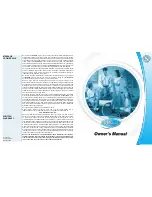
Page 7
The attachment tube (15) is useful for vacuuming corners and hard-to-reach
areas. The handle grip (1) should be in the upright, locked position
(as shown
in figure 1)
. Grip the attachment tube handle (11), pull it up and away from
the machine and stretch out the hose (12) until it locks to the back of the tube
(this locking action will prevent the hose from retracting back into the attach-
ment tube while it is in use). Various attachments may be inserted onto the
end of the tube. After use, remove attachment and re-insert the attachment
tube into the back of the machine.
Be sure that the attachment tube han-
dle (11) is inserted over the projection tab (see #23, page 5)
. If the attach-
ment tube handle is properly seated over the projection tab, the hose will
automatically retract and you may resume vacuuming. There is no need to
turn off the vacuum while switching from upright vacuuming to using the
attachment tube or hose.
To use the hose without the attachment tube
(as shown in figure 2)
, pull the
hose out of the attachment tube while the tube is still attached to the machine
and
securely seated over the projection tab (23).
Insert an attachment tool, if
desired, onto the end of the flexible hose. You may also release the hose while
the attachment tube is disengaged from the machine by pressing the release
button (2) at the base of the handle (11).
While using attachment tools, if the the power head brush roller is not able to
disengage from the floor surface, you may keep the brush roller off the car-
pet by placing the handle (1) in its upright locked position and lowering the
handle with one hand to raise the brush roller off of the floor. Operate attach-
ment accessories with the other hand. Or, with the handle in the upright
locked position, the machine may be tipped backward so that it rests on the
back side of the bag housing (6), and the power head is locked in a perpen-
dicular position to the floor.
To vacuum walls, under beds, or higher-reach areas, etc., the SEBO
essential
G can be fitted with an additional straight tube (45) and the wall and floor
brush (41). The machine will then perform as a canister vacuum
(as shown
in figure 3).
The pile adjustment wheel (18) has 4 brush height settings. Setting 1 is the low-
est brush setting and setting 4 is the highest brush setting. When starting the
vacuum, always start with the knob set at 4, then lower knob settings until the
brush reaches the proper height. The red brush light on the display panel will
light after 6 seconds if the brush is too high. Adjust the knob down. If after 6
seconds, the brush light stays unlit, the brush is at the proper setting for the pile.
The red brush light will also illuminate if the setting is too low. Adjust the knob
up until the light stays unlit after 6 seconds.
The Adjustment Wheel -
Figure 8
Red light
(
A
): Off – Operation of machine is normal
Red light
(
A
): Continuous – change bag or clear clog in the hose or
power head.
Red light
(
A
): Flashing and motor off – dust bag is full, or clog in the hose
or power head due to ignoring the continuous red warning
light for full bag or clog (see above)
Red light
(
B
): Off – Operation of brush is normal
Red light
(
B
): Continuous while in position 1 on the pile adjustment knob
(18) – brush is worn - change brush roller
Red light
(
B
): Continuous while in positions 1-4 – incorrect brush setting-
adjust the brush by turning the pile adjustment knob (18) to
a higher or lower position
Red light
(
B
): Flashing and motor switched off – clogged brush
Red light
(
B
): Flashing and motor switched off with no blockage – raise
brush to a higher position
For additional information on the display panel, see page 4
The Display Panel -
Figure 7
Figure 4
Figure 5
Figure 6
Figure 7
Figure 8
45
41
1
11
15
12
6
18
Using the Attachment Tube,
Hose & Attachments -
Figures 4, 5 & 6
B
A
A
– Bag full or clog indicator
B
– Brush clog or incorrect pile
setting monitor
































